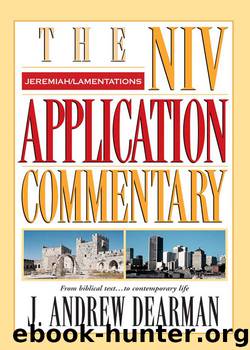Jeremiah, Lamentations (NIV Application Commentary, The) by J. Andrew Dearman

Author:J. Andrew Dearman [Dearman, J. Andrew]
Language: eng
Format: mobi
ISBN: 9780310872832
Publisher: Zondervan
Published: 2011-10-10T16:00:00+00:00
GOD’S WILL TO SAVE. Hananiah speaks forth-rightly about God’s sovereignty in a time of flux and uncertainty. According to this prophet from Gibeon, not only is the Lord of history capable of delivering his people from the hand of persecutors; it is his gracious desire to save them. Who would wish to quarrel with this? Certainly not Jeremiah! According to Jeremiah, Babylon is but a tool in the hands of the sovereign Lord, and when Babylon’s appointed task is complete, its worldly hegemony will come to an end. Moreover, the Lord will redeem his people and bring them back from exile. Hananiah and Jeremiah could agree on these central tenets.
Furthermore, did not God later do what Hananiah predicted when he moved Cyrus to release the exiles and the temple vessels so that both could return to their rightful home? Who among God’s people today would dispute Hananiah’s basic affirmation that God would deliver Judah? In light of God’s subsequent radical reach into human history, his encounter with human sinfulness in Christ, his costly dealings with human failure at the cross, and his glorious triumph over death itself in raising Christ from the dead, God demonstrates his resolve to save. Yes, Hananiah was right about God’s will to save.
Who speaks the truth? One sees a strange paradox in the dispute between Hananiah and Jeremiah. Hananiah’s certainty about the Lord is ill-timed while Jeremiah’s human hesitation in light of Hananiah’s initial prophecy is part of his care in listening for the Lord’s leading. Such leading can and does come from prophetic voices, but how can one know who speaks the truth? In Hananiah’s case, his certainty is ill-timed because he has failed to recognize the gravity of Judah’s failures. Yes, his sense of God as strong Deliverer is accurate, but his sense of God’s timing is wrong. Hananiah has an inadequate grasp of Judah’s predicament before the Lord, and because of this he has an inadequate grasp of what the Lord of history intends in adopting Babylon as his historical agent.
Is Judah’s predicament in 594/593 B.C. reflective of a mild miscalculation? Have the ongoing failures of Judah and the deportations of 597 been acknowledged by the people and dealt with adequately? Are the deportations of 597 the needed “slap on the wrist,” the “mid-course correction” to set Judah again on the path of righteousness in relationship to her Lord, so that all that remains is God’s liberation of the exiles and the temple vessels? No, unfortunately the true prophet sees that Judah has not comprehended adequately either its failures or the consequences of its failures, and the people as a whole have not been receptive to divine instruction. Hananiah is right to believe that God wants the return of his people, but his timing is wrong. In Christian terms, he wants to proclaim a resurrection without an acknowledgment of the necessity of the cross. Are there movements today within the church that “heal lightly the wound of the people”? The issue is not one of sincerity, but of truth.
Download
This site does not store any files on its server. We only index and link to content provided by other sites. Please contact the content providers to delete copyright contents if any and email us, we'll remove relevant links or contents immediately.
| New Testament | Old Testament |
The Five People You Meet in Heaven by Mitch Albom(3550)
The Secret Power of Speaking God's Word by Joyce Meyer(3167)
Real Sex by Lauren F. Winner(3006)
Name Book, The: Over 10,000 Names--Their Meanings, Origins, and Spiritual Significance by Astoria Dorothy(2978)
The Holy Spirit by Billy Graham(2942)
0041152001443424520 .pdf by Unknown(2843)
How The Mind Works by Steven Pinker(2811)
ESV Study Bible by Crossway(2773)
Ancient Worlds by Michael Scott(2680)
Churchill by Paul Johnson(2577)
The Meaning of the Library by unknow(2564)
The ESV Study Bible by Crossway Bibles(2547)
The Gnostic Gospels by Pagels Elaine(2527)
MOSES THE EGYPTIAN by Jan Assmann(2411)
Jesus by Paul Johnson(2351)
City of Stairs by Robert Jackson Bennett(2339)
The Complete Dead Sea Scrolls in English (7th Edition) (Penguin Classics) by Geza Vermes(2270)
The Nativity by Geza Vermes(2226)
Ancient Near Eastern Thought and the Old Testament by John H. Walton(2221)
